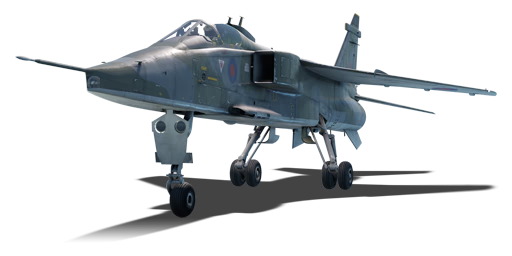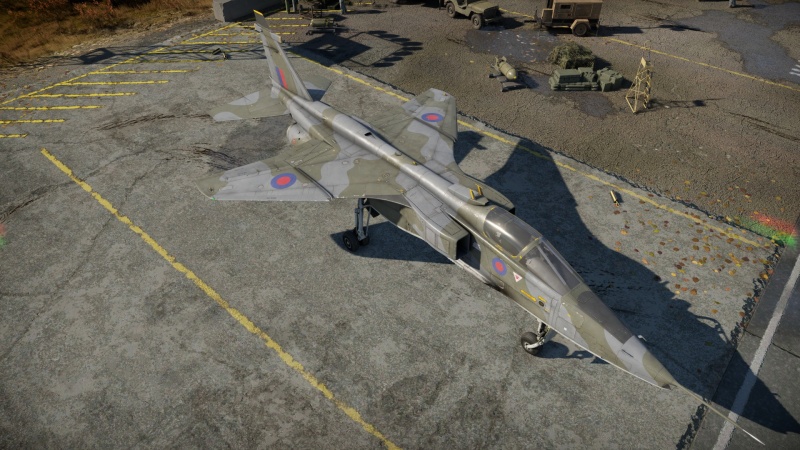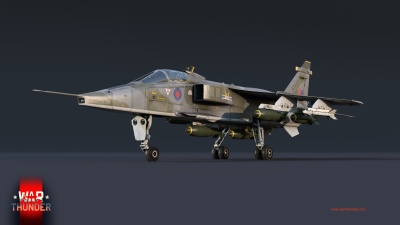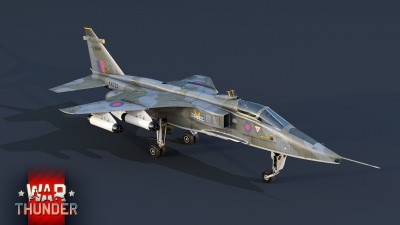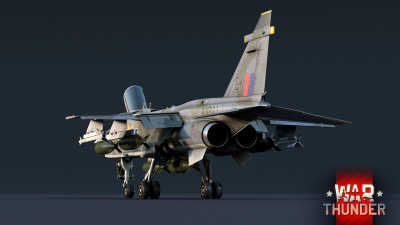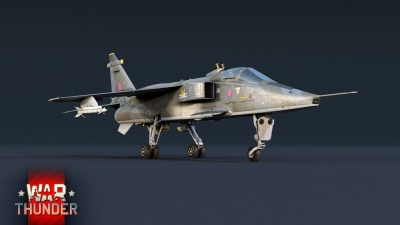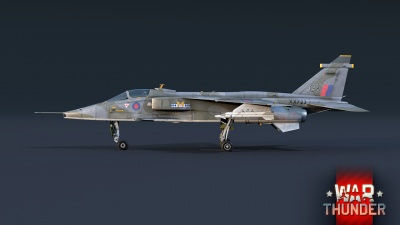Difference between revisions of "Jaguar GR.1"
(→Armaments: Added ballistic computer table) |
(→Description) (Tag: Visual edit) |
||
| Line 11: | Line 11: | ||
== Description == | == Description == | ||
<!-- ''In the description, the first part should be about the history of and the creation and combat usage of the aircraft, as well as its key features. In the second part, tell the reader about the aircraft in the game. Insert a screenshot of the vehicle, so that if the novice player does not remember the vehicle by name, he will immediately understand what kind of vehicle the article is talking about.'' --> | <!-- ''In the description, the first part should be about the history of and the creation and combat usage of the aircraft, as well as its key features. In the second part, tell the reader about the aircraft in the game. Insert a screenshot of the vehicle, so that if the novice player does not remember the vehicle by name, he will immediately understand what kind of vehicle the article is talking about.'' --> | ||
| − | The '''{{Specs|name}}''' is a rank {{Specs|rank}} British strike aircraft {{Battle-rating}}. It was introduced in [[Update "Raining Fire"]]. | + | The '''{{Specs|name}}''' is a supersonic rank {{Specs|rank}} British strike aircraft {{Battle-rating}}. It was introduced in [[Update "Raining Fire"]]. |
== General info == | == General info == | ||
Revision as of 17:49, 12 May 2021
| This page is about the British strike aircraft Jaguar GR.1. For the French version, see Jaguar A. |
Contents
Description
The Jaguar GR.1 is a supersonic rank VI British strike aircraft with a battle rating of 9.7 (AB/RB) and 10.0 (SB). It was introduced in Update "Raining Fire".
General info
Flight performance
| Characteristics | Max Speed (km/h at 10,668 m) |
Max altitude (metres) |
Turn time (seconds) |
Rate of climb (metres/second) |
Take-off run (metres) | |||
|---|---|---|---|---|---|---|---|---|
| AB | RB | AB | RB | AB | RB | |||
| Stock | 1,618 | 1,605 | 13716 | 31.8 | 32.4 | 74.2 | 66.2 | 850 |
| Upgraded | 1,690 | 1,649 | 28.5 | 30.0 | 109.5 | 90.0 | ||
Details
| Features | |||||
|---|---|---|---|---|---|
| Combat flaps | Take-off flaps | Landing flaps | Air brakes | Arrestor gear | Drogue chute |
| ✓ | ✓ | ✓ | ✓ | ✓ | ✓ |
| Limits | ||||||
|---|---|---|---|---|---|---|
| Wings (km/h) | Gear (km/h) | Flaps (km/h) | Max Static G | |||
| Combat | Take-off | Landing | + | - | ||
| 0 | 481 | 950 | 525 | 410 | ~12 | ~6 |
| Optimal velocities (km/h) | |||
|---|---|---|---|
| Ailerons | Rudder | Elevators | Radiator |
| < 650 | < 600 | < 720 | N/A |
Engine performance
| Engine | Aircraft mass | ||||||
|---|---|---|---|---|---|---|---|
| Engine name | Number | Basic Mass | Wing loading (full fuel) | ||||
| Rolls-Royce Turbomeca Limited Adour Mk.102 | 2 | 7,616 kg | 453 kg/m2 | ||||
| Engine characteristics | Mass with fuel (no weapons load) | Max Takeoff Weight | |||||
| Weight (each) | Type | 12m fuel | 20m fuel | 30m fuel | 42m fuel | ||
| 709 kg | Afterburning low-bypass turbofan | 8,545 kg | 9,165 kg | 9,940 kg | 10,869 kg | 13,500 kg | |
| Maximum engine thrust @ 0 m (RB / SB) | Thrust to weight ratio @ 0 m (WEP) | ||||||
| Condition | 100% | WEP | 12m fuel | 20m fuel | 30m fuel | 42m fuel | MTOW |
| Stationary | 1,998 kgf | 3,094 kgf | 0.72 | 0.68 | 0.62 | 0.57 | 0.46 |
| Optimal | 2,242 kgf (200 km/h) |
3,307 kgf (200 km/h) |
0.77 | 0.72 | 0.67 | 0.61 | 0.49 |
Survivability and armour
The Jaguar GR.1 has no armour plating or armoured glass. The entire wings of the Jaguar GR.1 are made up of fuel tanks, along with most of the upper fuselage, with flight controls being exposed in the "spine" of the aircraft. The two engines take up a small amount of room in the very rear of the fuselage.
Modifications and economy
Armaments
| Ballistic Computer | |||
|---|---|---|---|
| CCIP (Guns) | CCIP (Rockets) | CCIP (Bombs) | CCRP (Bombs) |
| |
|
|
|
Offensive armament
The Jaguar GR.1 is armed with:
- 2 x 30 mm ADEN Mk.4 cannons, belly-mounted (150 rpg = 300 total)
Suspended armament
The Jaguar GR.1 can be outfitted with the following ordnance:
- Without load
- 2 x AIM-9G Sidewinder missiles
- 76 x CRV7 M247 rockets
- 8 x 540 lb Mk.M1 bombs (4,320 lb total)
- 8 x 1,000 lb G.P. Mk.I bombs (8,000 lb total)
- 2 x AIM-9G Sidewinder missiles + 38 x CRV7 M247 rockets
- 6 x 540 lb Mk.M1 bombs + 2 x AIM-9G Sidewinder missiles (3,240 lb total)
- 6 x 1,000 lb G.P. Mk.I bombs + 2 x AIM-9G Sidewinder missiles (6,000 lb total)
Usage in battles
As a strike aircraft, the Jaguar is best suited to going after ground targets. Equipped with up to 8 x 1,000 lb bombs, it shines as a ground attack aircraft in Ground RB and is a very dangerous aircraft towards tanks. However, equipped with the air to air missiles (AIM-9Gs, which, are admittedly are not perfect, but since it was intended as a ground strike aircraft, they were intended for self defence) and a pair of ADEN 30 mm cannons, it is also a very real threat to any fighters that find a Jaguar behind them, or indeed ahead of them and closing fast. The main strategy is to act as a support aircraft, rather than flying solo against enemy fighters. A rather handy drag chute and arrestor gear is provided, though it is not advised to use a Jaguar alongside a carrier, as the arrestor gear was only intended for situations where the normal wheel and air brakes had failed.
However, you cannot forget in the Jaguar that you are a glorified strike aircraft. You only have 2 missiles at most, and 300 rounds, to which trigger discipline, is as always, a must. Again, engaging fighters is not a problem, and the Jaguar is very agile without a lot on bombs slung underneath.
Enemies worth noting:
As a member of NATO teams you can and will face MiG-21s. The F-13/J-7II (Chinese) are a pair of dangerous opponents, with their 30 mm guns, but the missiles are not fatal. They are the equivalent of AIM-9Bs, and can lose track if you are operating at long range or turning. Ideally fire it when you are at a close range or without the risk of the aircraft turning. The SMT/MF/Bis variants are much more of a threat. With R-60 missiles, they are to be feared and respected.
Again, F-4s are very dangerous. However, unlike the MiG-21, they get access to far more ammunition for their guns. They also get access to SARH missiles, as well as AIM-9J missiles on the E/EJ variants.
Any other fighters:
The best rule of thumb is to play safe, if you are flying as a ground strike aircraft, but usual rules apply when engaging enemy fighters.
Pros and cons
Pros:
- Capable of using AIM-9G Sidewinder missiles that have decent range and turn performance.
- Manoeuvrable, especially compared to the T-2 and F-4
- Decent roll rate.
- Decent CAS loadouts.
- Armed with the powerful ADEN cannons.
- Equipped with RWR to warn about incoming radar-guided missiles.
- Has large gear for its size.
- Has a Head-Up Display in the cockpit which provides flight information and weapon aiming functionality.
Cons:
- Mediocre speed performance.
- Mediocre climb rate and energy retention.
- Can only load two missiles.
- Can't utilize SARH and/or BVR.
- Not equipped with radar.
History
The Jaguar was a joint program between the British and French to develop a cheap subsonic trainer and light attack aircraft. The British and French bought a total of 403 aircraft with Britain receiving 203 of the aircraft. Other exports include to the Indian Air force (160 total aircraft ordered ), The Royal Air force of Oman (26 total aircraft ordered), The Ecuadorian Air force (12 total aircraft ordered) and the air force of Nigeria (18 total aircraft ordered). The Jaguar was used in several military conflicts in countries such as: Mauritania, Chad, Iraq, Bosnia, Pakistan and The Chenepa war but most notably it saw service in the 1990 Gulf War during Operation Desert Storm, where it was used to destroy Iraqi artillery and missile positions. During the Bosnian bombing campaign of 1995 Jaguars of the 41 squadron carried out the first raids in Europe since the second world war. During the Bosnian airstrikes jaguars were fitted with laser designators and would laze Bosnian-Serb forces for RAF Harriers to strike. These re-fitted more modern Jaguars were re-designated as SEPECAT Jaguar GR.1 B.
Devblog
In the early 1960's, both Great Britain and France were looking into procuring a new jet trainer for their respective air forces. Despite differences in specifications and requirements, the two nations were united in their pursuit for such a new aircraft, thus leading to an agreement being signed in 1965 which would kick off development of what would eventually become the Jaguar.
The Jaguar was being developed under a specially formed consortium of British and French aviation companies, namely Breguet and BAC, called SEPECAT (you can look up what the acronym stands for on your own - we promise you won't be disappointed though). Continuing with the theme of joint projects, Rolls-Royce and Turbomeca also joined forces to develop a new turbofan engine - the Adour - for the new aircraft.
The first of eight prototypes of the Jaguar successfully conducted its maiden flight in September of 1968. Following the conclusion of further testing, the Jaguar went into production in two major variants - the Jaguar A being the modification used by the French Air Force and the Jaguar S (Jaguar GR.1) being the variant employed by the RAF. Both variants of the machine entered production in the early 1970's, with the first production models being delivered in 1973/'74.
The Jaguar primarily served with France and Great Britain, most notably distinguishing itself in action during the Gulf War of the 1990's. However, Ecuador, Nigeria and Oman also operated modifications of the Jaguar, while India still operates the Jaguar to this day. In total over 540 SEPECAT Jaguars were built.
Media
- Jaguar GR.1 Devblog Images
See also
External links
| SEPECAT | |
|---|---|
| Jet fighters | Jaguar A · Jaguar E · Jaguar GR.1 · Jaguar GR.1A · Jaguar IS* |
| SEPECAT was a joint venture between BAC (later BAe) and Bréguet (later merged with Dassault). Production were split between the two manufacturers. *Built by BAe and Hindustan Aeronautics Limited (HAL). | |
| Britain jet aircraft | |
|---|---|
| Blackburn | Buccaneer S.1 · Buccaneer S.2 · Buccaneer S.2B |
| British Aerospace | Harrier GR.7 · Sea Harrier FRS.1 (e) · Sea Harrier FRS.1 · Sea Harrier FA 2 |
| British Aircraft Corporation | Strikemaster Mk.88 |
| English Electric | Canberra B Mk 2 · Canberra B (I) Mk 6 · Lightning F.6 · Lightning F.53 |
| Gloster | Meteor F Mk 3 · Sea Meteor F Mk 3 · Meteor F Mk 4 G.41F · Meteor F Mk 4 G.41G · Meteor F Mk.8 G.41K · Meteor F Mk.8 Reaper |
| Javelin F.(A.W.) Mk.9 | |
| de Havilland | Vampire F.B.5 · Venom FB.4 · Sea Venom FAW 20 · Sea Vixen F.A.W. Mk.2 |
| Hawker | Sea Hawk FGA.6 · Hunter F.1 · Hunter F.6 · Hunter FGA.9 · Harrier GR.1 · Harrier GR.3 |
| Panavia | Tornado GR.1 · Tornado F.3 · Tornado F.3 Late |
| SEPECAT | Jaguar GR.1 · Jaguar GR.1A · Jaguar IS |
| Supermarine | Attacker FB 1 · Attacker FB.2 · Scimitar F Mk.1 · Swift F.1 · Swift F.7 |
| Foreign | Phantom FG.1 (USA) · Phantom FGR.2 (USA) · F-4J(UK) Phantom II (USA) |
| Australia | F-111C |
| India | ▄MiG-21 Bison |
| South Africa | ▄JAS39C |


